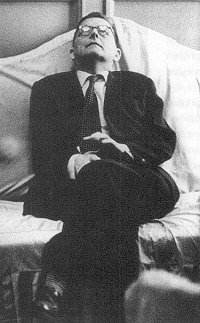I suspect Bernard Haitink's performance of this epic symphony will divide opinion - sharply. There can be no question that it was wonderfully played, with glorious solos by the cor anglais and trumpet players lastingly memorable, and strings, particularly basses, which achieved extraordinary depth of tone. But it was also conceived on the broadest scale, and ultimately became a performance which teetered between soulessness and an overwhelming monumentalism.There can also be no doubt that at the helm, steering us through this tragic work, was a great Mahler conductor. Rarely have I heard a performance of any Shostakovich symphony which so clearly owed a debt to late Mahler. Haitink's opening Largo fanned memories of the final movement of Mahler's Ninth - so much so that I wondered whether I had strayed into the wrong concert. Where was the bleakness? Where was the sparseness? Certainly not here. There was opulence on a quite breathtaking scale that gave the opening movement no sense of universal suffering. True, the inexorable development of the opening theme lead to some quite shattering climaxes. But were they desperate enough? No.
What this movement did have in spades was an architectural strength that was impressive. Haitink built the momentum slowly, but at least he did so in a singular arc. The spaces were vast, but the tempo increases did not seem dynamic enough to really brutalise the music.
There was a similar problem with the two middle movements, which lacked assertiveness and genuine physicality. The pulse always shied away from being truly demonic. As the second great climax emerged from the dawn of a shallow grimness to shred the nerves I felt less certain we had reached the point of apocalypse than I usually do at this point in the symphony.
The finale is an ambiguous movement. Is it genuinely triumphant, or does its ending (hushed as it fades to stillness) suggest something more sinister? The third climax was again thrilling, unleashed with enormous power, but Haitink himself provided something of a quandary for us here. His tempi were neither as slow nor as fast as they had been at various stages throughout the previous movements. In other words, I don't think Haitnik himself had quite resolved the question of how to end this symphony. In contrast to the preceding development it appeared rather lightweight, although probably as satisfying and valid as any other interpretation of this strange movement.
Haitink's view of this work is a very Western one. It really needs a conductor who can understand the circumstances under which it was written - someone who understands real suffering. The message of this symphony is an eternally valid one, but this evening's performance almost appeared to rewrite history. The beauty of the LSO's playing, the precision in the woodwind and brass, did nothing to reveal the soul of this great work. It was ultimately a hollow performance, a shell without the oyster.
Earlier in the evening we had heard four LSO principals in Haydn's Sinfonia Concertante in B flat. Haitink's name does not immediately come to mind as a master of eighteenth century music, but a master he became directing a nimble-paced, elegant performance. Gordan Nikolitch (violin), Tim Hugh (cello), Roy Carter (oboe) and the ever-wonderful Rachel Gough (bassoon) were keenly musical, delivering a beautifully transparent performance.
This concert will be played again tomorrow evening at the Barbican, 22 June at 7.30pm.
Marc Bridle

 Return to:
Return to: